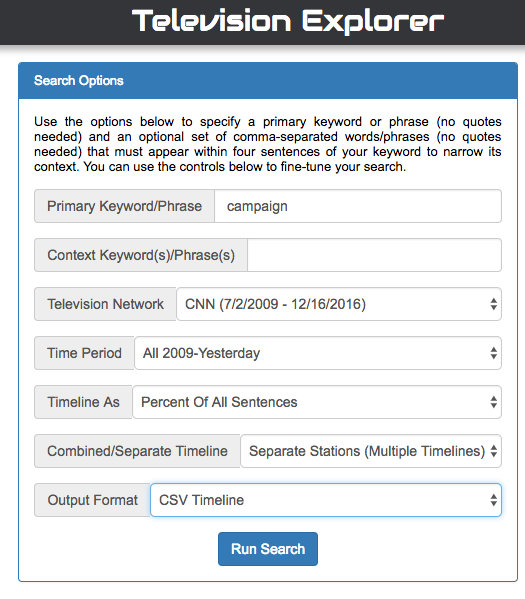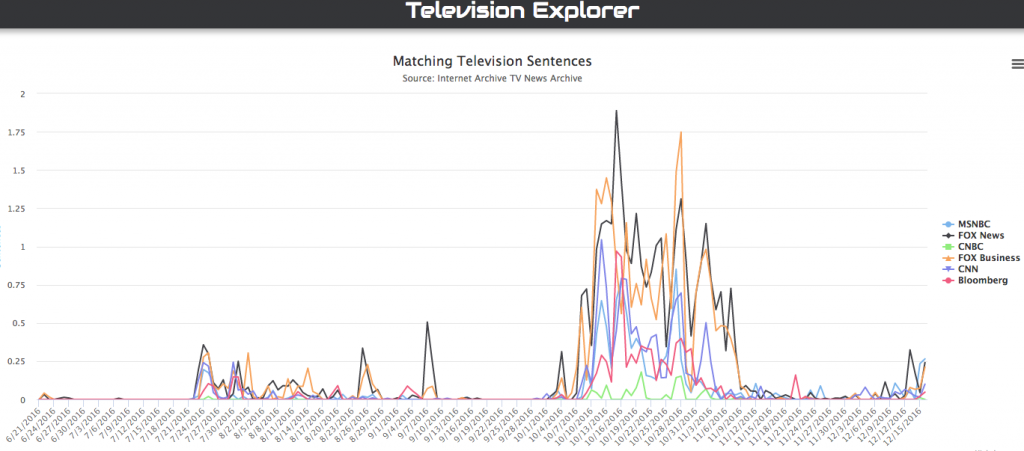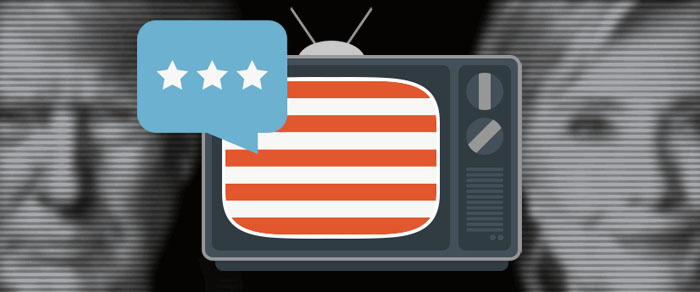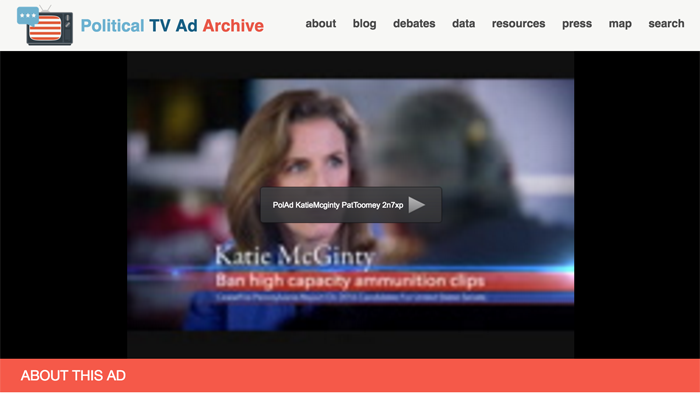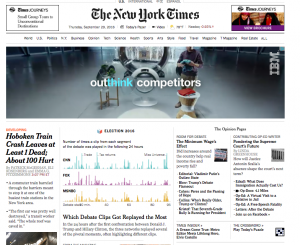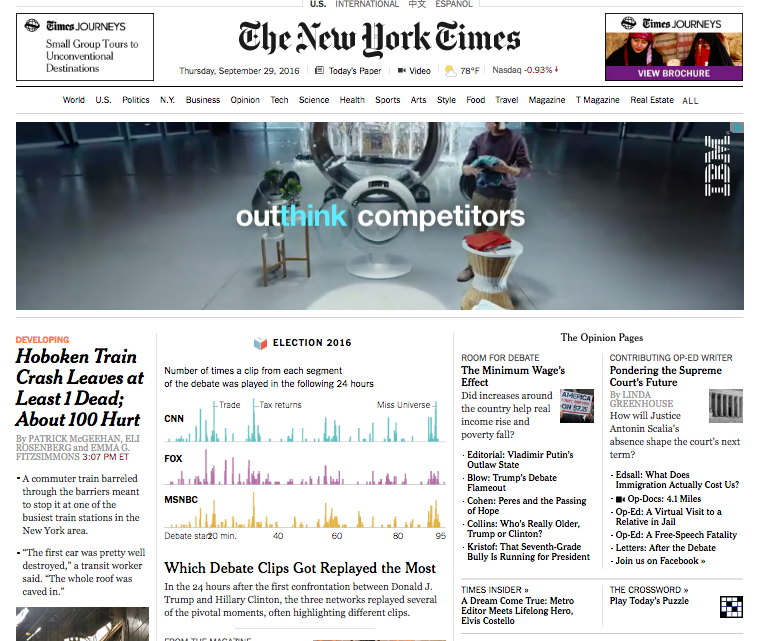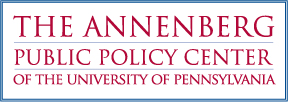Research by Robin Chin
Is it 1968? Many pundits have been asking this question in recent days, in the lead up to what is expected to be a contentious–and some worry about violent–GOP convention in Cleveland, where Donald Trump is expected to accept the GOP nomination. A spate of mass gun killings, the death of two African American men in recent weeks at the hands of police, the murder of five police officers by a sniper during a demonstration and then three more by a lone gun man in Baton Rouge, terrorism here and abroad, involvement overseas in intractable conflicts, growing economic inequality — none of these developments quite parallel the tumultuous events of the 1960s. But the situation was volatile then, and it’s volatile now.
To set the scene, thanks to the TV News Archive, the Internet Archive‘s online free library of TV news clips, revisiting some of the more “crazy” conventions of years past (headline by Politico), or simply notable or controversial moments, is just a search away. All of these clips are editable, embeddable, and shareable on social media.
Chicago, 1968
When the Democrats met in Chicago in 1968, it was in the shadow of the assassinations of Martin Luther King and Democratic primary candidate Robert Kennedy. Vice President Hubert Humphrey had the support of the some 60 percent of the delegates, largely local party leaders — people who would be super delegates today. While a liberal, Humphrey’s support of the war as Lyndon B. Johnson’s vice president made him unpopular in the anti-war movement.
As described by Politico, “With Humphrey’s nomination all but certain, protesters associated with the Youth International Party (the Yippies) and National Mobilization Committee to End the War in Vietnam (the MOBE) took to the streets outside Chicago’s convention hall; inside, city policemen allied with the local political machine roughed up liberal delegates and journalists in plain view of news cameras. “I wasn’t sentenced and sent here!” a prominent New York Democrat bellowed as a uniformed officer dragged him off the floor. “I was elected!”
The clip below, from the CNN documentary series, “The Sixties,” shows police beating up protestors on the streets. A special commission appointed to investigate the protests characterized the violent events as a “police riot” directed at protesters and recommended prosecution of police who used indiscriminate violence.
That same night, Humphrey took to the podium to accept the nomination. He referred the violence outside when he said, “[O]ne cannot help but reflect, the deep sadness that we feel over the troubles and the violence which have erupted regrettably and tragically in the streets of this great city and for the personal injuries that have occurred. Surely we have now learned the lesson that violence breeds counter violence and it cannot be condoned whatever the source.”
San Francisco, 1964
In 1964, GOP moderates Nelson Rockefeller and George Romney, then governor of Michigan, led an unsuccessful campaign against conservative insurgent Barry Goldwater, at a convention Goldwater biographer Robert Alan Goldberg later dubbed the “Woodstock of the right.” (Romney was former presidential candidate Mitt Romney’s father.) Goldwater was a fierce opponent of the Civil Rights Act and strong supporter of military intervention against the Soviet Union.
Some have compared him to Trump because of his belligerence and unpopularity with the establishment Republicans. For example, like Trump, he was not one to mince words about his enemies. At the convention, when asked by a reporter about LBJ and the Civil Rights Act, he replied, “He’s the phoniest individual who ever came around.”
The convention was raucous, filled with delegates booing the moderates — as when Rockefeller called on the crowd to reject extremists. But the moment most remembered was when Goldwater took the podium to accept the nomination, when, to enormous applause, he said:
“I would remind you that extremism in the defense of liberty is no vice. [applause] And let me remind you also that moderation in the pursuit of justice is no virtue.”
Goldwater went on to lose the election, badly, to Lyndon B. Johnson.
Other historic moments
The TV News Archive is full of many other convention speech clips of moments that turned history’s tide. Here, for example, is John F. Kennedy, accepting the Democratic nomination in 1960, stating that voters should not “throw away” their vote because of concern about his religious affiliation. He went on to become the first Catholic president of the United States.
And here is Richard Nixon, in his 1968 nomination speech, talking about the increase in crime and criticizing those who say “law and order” was code for racism. He was speaking to the charged issues surrounding race and policing at the time:
“Time is running out for the merchants of corruption…and to those who say law and order is a code word for racism there and here is the reply. Our goal is justice for every American. If we are to have respect for law in America we must have laws that deserve respect.”
Nixon’s words, however, have a doubly ironic ring today. First, because the debate over policing in the African American community stubbornly persists decades later. And second, because of his own role in covering up the Watergate scandal, which involved dirty tricks against the Democrats during the 1972 campaign. Nixon would eventually resign from the presidency in 1974. Three years later, in 1977, the journalist David Frost asked Nixon under what circumstances a president can do something illegal. Nixon’s famous answer: “Well, when the president does it, that means that it is not illegal.”
For those wanting to plumb the riches of past convention speeches, below is a list, with links, of most major convention speeches by nominees, starting with Harry Truman in 1948 and going to Barack Obama in 2012. The speeches were broadcast on C-Span.
1948: Harry Truman acceptance speech at Democratic National Convention in Philadelphia, PA Part 1.
Harry Truman acceptance speech at Democratic National Convention in Philadelphia, PA Part 2.
1952: Adlai Stevenson acceptance speech at Democratic National Convention in Chicago, IL Part 1.
Adlai Stevenson acceptance speech at Democratic National Convention in Chicago, IL Part 2.
1956: Republican Convention and Eisenhower’s nomination Universal newsreel.
Dwight D. Eisenhower acceptance speech at Republican National Convention in Daly City, CA Part 1.
Dwight D. Eisenhower acceptance speech at Republican National Convention in Daly City, CA Part 2.
1960: John F. Kennedy acceptance speech at 1960 Democratic National Conventions in Los Angeles, CA Part 1.
John F. Kennedy acceptance speech at 1960 Democratic National Conventions in Los Angeles, CA Part 2.
Former President Hebert Hoover speech at Republican National Convention Chicago, IL.
Henry Cabot Lodge VP acceptance speech at National Convention Chicago, IL.
1964: Barry Goldwater acceptance speech at Republican National Convention Daly City, CA.
Robert Kennedy speech at Democratic National Convention Atlantic City, NJ.
Lyndon Johnson acceptance speech Atlantic City, NJ Part 1.
Lyndon Johnson acceptance speech Atlantic City, NJ Part 2.
1968: Spiro Agnew VP acceptance speech at Republican National Convention in Miami Beach, FL.
Richard Nixon acceptance speech at Republican National Convention Miami Beach, FL.
Hubert Humphrey acceptance speech at Democratic National Convention Chicago, Il NBC News.
1972: McGovern acceptance speech at Democratic National Convention Miami Beach, FL Part 1.
McGovern acceptance speech at Democratic National Convention Miami Beach, FL Part 2.
Richard Nixon acceptance speech at Republican National Convention Miami Beach, FL.
Richard Nixon acceptance speech at Republican National Convention Miami Beach, Florida NBC News.
1976: Barbara Jordan keynote speech at Democratic Convention New York, NY.
Jimmy Carter acceptance speech at Democratic National Convention New York, NY Part 1.
Jimmy Carter acceptance speech at Democratic National Convention New York, NY Part 2.
August 17, 1976 Republic National Convention Kansas City, MO delegates debating Ronald Reagan rule requiring Ford to name VP before they vote CBS News Part 1.
August 17, 976 Republic National Convention Kansas City, MO includes delegates debating Ronald Reagan rule C16 requiring Ford to name VP before they vote CBS News Part 2.
Gerald Ford acceptance speech at the Republican National Convention Kansas City, MO Part 1.
Gerald Ford acceptance speech at the Republican National Convention Kansas City, MO Part 2.
Ronald Reagan endorsement speech of Gerald Ford as Presidential Nominee at Republican National Convention Kansas City, MO.
1980: Ronald Reagan acceptance speech at the Republican National Convention Detroit, MI.
Ted Kennedy speech at Democratic National Convention in New York. Kennedy was a rival for the Democratic presidential nomination.
Jimmy Carter acceptance speech at Democratic National Convention in New York, NY Part 1.
Jimmy Carter acceptance speech at Democratic National Convention in New York, NY Part 2.
1984: Geraldine Ferraro VP acceptance speech at Democratic National Convention San Francisco, CA.
Walter Mondale acceptance speech at Democratic National Convention San Francisco, CA Part 1.
Walter Mondale acceptance speech at Democratic National Convention San Francisco, CA Part 2.
Ronald Reagan acceptance speech at Republican National Convention Dallas, TX.
Mario Cuomo keynote speech at Democratic National Convention San Franciso, CA.
1988: Ann Richards keynote speech at Democratic National Convention Atlanta, GA.
Michael Dukakis acceptance speech at Democratic National Convention Atlanta, GA Part 1.
Michael Dukakis acceptance speech at Democratic National Convention Atlanta, GA Part 2.
Dan Quayle VP acceptance speech at Republican National Convention New Orleans, LA.
George H.W. Bush acceptance speech at Republican National Convention New Orleans, LA.
1992: Barbara Jordan speech at Democratic National Convention New York, NY.
Al Gore VP acceptance speech at Democratic National Convention New York, NY.
Bill Clinton acceptance speech at the Democratic National Convention New York, NY.
Pat Buchanan Keynote speech at Republican National Convention Houston, TX.
Ronald Reagan speech at Republican National Convention Houston, TX Part 1.
Ronald Reagan speech at Republican National Convention Houston, TX Part 2.
George H. W. Bush acceptance speech at the Republican National Convention Houston, TX.
1996: Jack Kemp VP acceptance speech at Republican National Convention San Diego, CA.
Bob Dole acceptance speech at Republican National Convention San Diego, CA.
Hillary Clinton speech at the Democratic National Convention Chicago, IL.
Bill Clinton acceptance speech at the Democratic National Convention Chicago, IL. (Currently not available on the TV News Archive.)
2000: Dick Cheney VP 2000 acceptance speech at Republican National Convention in Philadelphia, PA.
George W. Bush acceptance speech at Republican National Convention in Philadelphia, PA Part 1.
George W. Bush acceptance speech at Republican National Convention in Philadelphia, PA Part 2.
Al Gore acceptance speech at Democratic National Convention in Los Angeles, CA.
2004: Barack Obama keynote speech at Democratic National Convention Boston, MA. (Currently not available on the TV News Archive.)
2004 John Edwards speech at Democratic National Convention Boston, MA.
John Kerry acceptance speech at Democratic National Convention Boston, MA.
John McCain speech at Republican National Convention New York, NY.
Laura Bush speech at Republican National Convention New York, NY.
George W. Bush acceptance speech at Republican National Convention New York, NY. (Currently not available on the TV News Archive.)
2008: Ted Kennedy speech at Democratic National Convention Denver, CO.
Michelle Obama speech at Democratic National Convention Denver, CO.
Bill Clinton speech at Democratic National Convention Denver, CO.
Joe Biden VP portion of acceptance speech at Democratic National Convention Denver, CO.
Barack Obama acceptance speech at Democratic National Convention Denver, CO.
Sarah Palin VP acceptance speech at Republican National Convention St. Paul, MN.
Cindy McCain speech at Republican National Convention St. Paul, MN.
John McCain acceptance speech at Republican National Convention St. Paul, MN.
2012: Barack Obama acceptance speech at Democratic National Convention Charlotte, NC CSPAN coverage.
Mitt Romney acceptance speech at Republican National Convention Tampa, FL CSPAN coverage.
